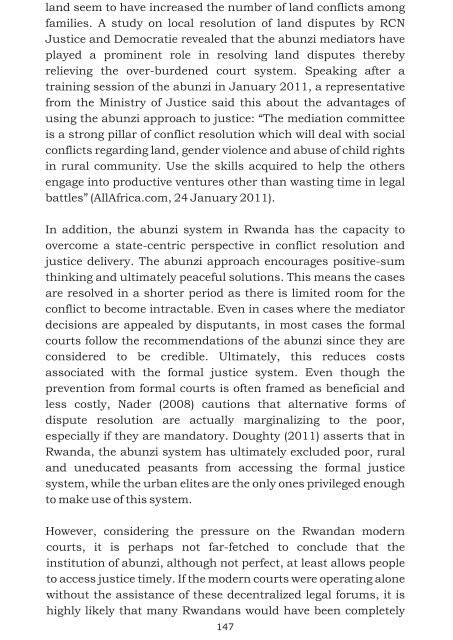Beneficiaries are actors too.pdf - Southern Institute of Peace ...
Beneficiaries are actors too.pdf - Southern Institute of Peace ...
Beneficiaries are actors too.pdf - Southern Institute of Peace ...
You also want an ePaper? Increase the reach of your titles
YUMPU automatically turns print PDFs into web optimized ePapers that Google loves.
land seem to have increased the number <strong>of</strong> land conflicts among<br />
families. A study on local resolution <strong>of</strong> land disputes by RCN<br />
Justice and Democratie revealed that the abunzi mediators have<br />
played a prominent role in resolving land disputes thereby<br />
relieving the over-burdened court system. Speaking after a<br />
training session <strong>of</strong> the abunzi in January 2011, a representative<br />
from the Ministry <strong>of</strong> Justice said this about the advantages <strong>of</strong><br />
using the abunzi approach to justice: “The mediation committee<br />
is a strong pillar <strong>of</strong> conflict resolution which will deal with social<br />
conflicts regarding land, gender violence and abuse <strong>of</strong> child rights<br />
in rural community. Use the skills acquired to help the others<br />
engage into productive ventures other than wasting time in legal<br />
battles” (AllAfrica.com, 24 January 2011).<br />
In addition, the abunzi system in Rwanda has the capacity to<br />
overcome a state-centric perspective in conflict resolution and<br />
justice delivery. The abunzi approach encourages positive-sum<br />
thinking and ultimately peaceful solutions. This means the cases<br />
<strong>are</strong> resolved in a shorter period as there is limited room for the<br />
conflict to become intractable. Even in cases where the mediator<br />
decisions <strong>are</strong> appealed by disputants, in most cases the formal<br />
courts follow the recommendations <strong>of</strong> the abunzi since they <strong>are</strong><br />
considered to be credible. Ultimately, this reduces costs<br />
associated with the formal justice system. Even though the<br />
prevention from formal courts is <strong>of</strong>ten framed as beneficial and<br />
less costly, Nader (2008) cautions that alternative forms <strong>of</strong><br />
dispute resolution <strong>are</strong> actually marginalizing to the poor,<br />
especially if they <strong>are</strong> mandatory. Doughty (2011) asserts that in<br />
Rwanda, the abunzi system has ultimately excluded poor, rural<br />
and uneducated peasants from accessing the formal justice<br />
system, while the urban elites <strong>are</strong> the only ones privileged enough<br />
to make use <strong>of</strong> this system.<br />
However, considering the pressure on the Rwandan modern<br />
courts, it is perhaps not far-fetched to conclude that the<br />
institution <strong>of</strong> abunzi, although not perfect, at least allows people<br />
to access justice timely. If the modern courts were operating alone<br />
without the assistance <strong>of</strong> these decentralized legal forums, it is<br />
highly likely that many Rwandans would have been completely<br />
147


